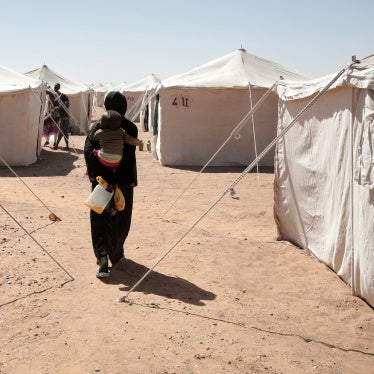While Bangui and parts of the west remain stable, the surge of violence in the central provinces reveals the fragile situation for civilians in the Central African Republic, as described in the report of the Independent Expert and OCHA head Stephen O'Brien who has warned of “another large-scale humanitarian crisis”. Human Rights Watch shares that concern.
We have documented hundreds of unlawful deaths in the past five months. Both Seleka factions and anti-balaka fighters have attacked civilians and committed other abuses.
In Alindao, at least 136 civilians were killed on May 9 in attacks by the UPC, a Seleka faction. Our researchers also documented 26 cases of rape by UPC fighters in the Basse Kotto province that month. This is in the context of a conflict where all parties have used rape and sexual violence as a tactic of war on an alarming scale.
On May 13 in Bangassou town, anti-balaka forces attacked the town’s mosque, killings scores. Muslim civilians continue to seek shelter at the town’s Catholic parish.
After the reporting period of the Independent Expert’s report ended, since late June, armed Muslims have killed at least 28 civilians in Zemio. The assailants had no clear link to the Seleka and apparently conducted a pre-emptive attack due to more anti-balaka in the town.
On July 29, fighters from the MPC, a Seleka faction, attacked neighborhoods near a displacement camp in Batangafo. They killed at least 15 civilians and burned roughly 230 huts and homes. The fighters attacked the area again this month, killing at least six.
Two steps are essential to help stop this violence against civilians: 1) peacekeepers should do more to protect civilians; and 2) perpetrators must be held to account.
On the first, some UN officials have requested more personnel and resources for the mission. The Security Council and member states should give the mission the tools it needs so peacekeepers can fulfil their mandate to protect civilians. On the second, the UN and its member states should support the unique opportunity presented by the Special Criminal Court. This hybrid body offers a chance to end the impunity that has dominated the country for so long. We’ve seen progress recently to operationalize the court, but success depends on sustained financial, technical and logistical support, including protection for witnesses and court personnel.








